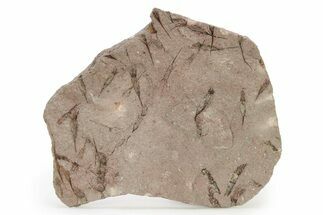This Specimen has been sold.
5.4" Ordovician Ampyxina Trilobite Mortality Plate - Missouri
This is a mortality plate containing ten Ordovician trilobites of the species Ampyxina bellatula. These trilobites were collected from the Maquoketa Formation of Pike County, Missouri. All of the trilobites feature prone (dorsal) presentation and the largest trilobite is .44" long.
There is a repaired crack through the rock and a smaller repaired crack through a trilobite where a chip of the rock broke free. It comes with an acrylic display stand.
There is a repaired crack through the rock and a smaller repaired crack through a trilobite where a chip of the rock broke free. It comes with an acrylic display stand.
About Trilobites
Trilobites are an extinct class of marine arthropods that thrived for nearly 270 million years, from the early Cambrian to the end of the Permian period (around 521 to 252 million years ago). They are one of the most successful and diverse groups in the history of life, with over 25,000 described species spanning a wide range of sizes, shapes, and ecological niches. Known for their distinctive, segmented exoskeletons, trilobites provide invaluable insights into the evolutionary history of arthropods and the dynamics of ancient marine ecosystems.
Trilobites are an extinct class of marine arthropods that thrived for nearly 270 million years, from the early Cambrian to the end of the Permian period (around 521 to 252 million years ago). They are one of the most successful and diverse groups in the history of life, with over 25,000 described species spanning a wide range of sizes, shapes, and ecological niches. Known for their distinctive, segmented exoskeletons, trilobites provide invaluable insights into the evolutionary history of arthropods and the dynamics of ancient marine ecosystems.
SPECIES
Ampyxina bellatula
AGE
LOCATION
Pike County, Missouri
FORMATION
Maquoketa Formation
SIZE
Largest trilobite .44" long, 5.4 x 4.1" limestone
CATEGORY
ITEM
#135528
We guarantee the authenticity of all of our specimens.
 Reviews
Reviews













